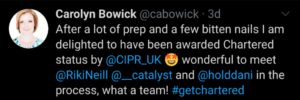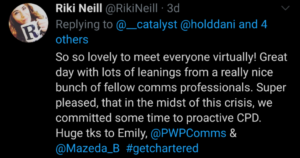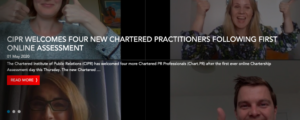
#GetChartered – we can all aim high
Applying for the CIPR Chartership was never on my radar and to be honest with you, it’s something I always thought only senior comms leaders applied for. Yet, I’m now able to share my experiences of becoming Chartered that I hope will ease some of your hesitations and perhaps inspire you to apply.
CIPR news article following the first online assessment day
There is no checklist that will tell you when you’re ready. When I spotted the #GetChartered dates in a CIPR newsletter, I started a couple of conversations with fellow CIPR Inside committee members I knew had already achieved Chartered status. With no pressure, they gave me the reassurance that with my experiences to date, I would be fine and I’m no senior director of communications!
Now for those that don’t know me, I’ve never managed a large team or worked in multiple PR disciplines and with the word ‘officer’ in my title, I doubted whether Is should apply. My advice for you is that if you’re reading this, then not only are you thinking of your #CPD which is great but you are likely to be ready.
If you’re a CIPR member, then check out the CIPR East Angelia webinar ‘Get Chartered 101’ by Michelle Nelson and Ruth Jackson. It provides a useful overview of what to expect and some handy tips to help you prepare, some I’ve included in this blog I found helpful.

Fellow attendee based in Scotland, Carolyn Bowick
Preparing for the assessment
The tips I’m sharing below I found worked for me and hopefully they will help you but there is no right or wrong way of preparing, do what works best for you.
About a month before the assessment day start thinking about examples of work you have delivered that went well and also not so well. A brilliant piece of advice I received is to work through your CV, listing examples of ethics, leadership and strategy.
Alongside this, spend some time reading the Chartership Handbook as it contains lots of tips, including advice from assessors based on previous assessment days. There are also additional competencies that the assessors will look for, contained in the handbook. These aren’t there to catch you out, so just keep them in mind as you think our your examples.
I’d also suggest thinking about your CPD plans for next two years as you’ll share this in a peer session during the day. You’ll receive a template nearer the time, but it’s one less thing for you to be rushing to complete.
About two weeks before the assessment day you’ll receive an electronic pack from the CIPR membership team containing three case studies, focused on ethics, leadership and strategy. At this stage, you’ll be able to reference back to your own examples against the questions for each of the case studies. Don’t just focus on the questions provided though, think around the case studies and examples you can draw upon.
Like me, you’ll perhaps feel reassured that you can have notes with you but keep them short and easy to reference back to. I found it helpful for each of the case studies themes to have my examples listed on a single page, just to act as a prompt. Something else I also found helpful was to have all the other competencies listed, just to remind me if I had a blank moment.
The CIPR wants you to pass so make use of all the resources they have provided for you. The handbook is a great resource and there are plenty of Chartered PR practitioners willing to help and support you. Also search on the CPD portal for extra resources that might have been uploaded since this article was published.

Also attending from Scotland, Alison Arnot
My experience of the day
I was one of four practitioners who joined the first online assessment day and yes; I was nervous, but I really enjoyed the day. The two facilitators were fantastic at making sure we all contributed in each of the sessions and it was insightful listening to everyone’s own experiences.
You’ll receive very clear joining instructions from the CIPR membership team so you’ll know exactly what to expect from the day. Even though I spent the weekend before writing some notes and prompts I took the day before off work to go through everything and try to avoid the last minute panic the night before. If you can do this, I’d highly recommend doing so as I felt much calmer going to bed and it put me in a much better headspace the following morning.
It’s worth making sure you keep your personal and work phones off to avoid any distractions. As your taking the time to invest in your CPD, book the day off and to focus on you. I know it’s tempting to monitor emails but use the breaks to focus on the next session.
Another benefit of the day is the peer review of your CPD plan. It’s a superb way to sense check your thinking and have a fresh perspective on the areas you want to focus on over the next two years. I took away a few points to reflect on and also got ideas from the other attendees to think about incorporating into my plan.

Joining from Northern Ireland, Riki Neill
My main thoughts for you
If you didn’t have time to read any of the above, then here are my key points for you to keep in mind.
Space out your preparation – Don’t wait till you receive the joining pack. Give yourself the time to prepare and start early. It will reduce the stress you’ll be putting on yourself.
Use the resources available – There are lots available, both from the CIPR and other practitioners, so don’t be afraid to use them. Webinars, blogs and Q&A events run by the sectoral groups are all there to help you.
Talk through your thinking – There is nothing better than picking up the phone and talking through your thoughts. It will help give context to your notes and expand on your examples.
Don’t underestimate your own ability – I said it above, if you are reading this then it’s likely you’re ready. If you don’t know any chartered practitioners, please get in touch with me or contact the membership team at CIPR who are friendly and will be more than happy to help.
Good luck and I look forward to hearing about your success.
Featured image by Free-Photos from Pixabay

